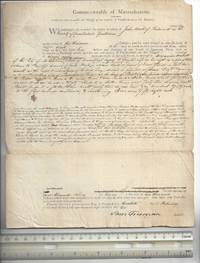Massachusetts Writ: To Impound John Waite (former Colonel In The Massachusetts Militia And Served In The Revolutionary War) 1810 -

Massachusetts Writ: to impound John Waite (former Colonel in the Massachusetts Militia and served in the Revolutionary War) 1810
- Used
- Signed
- first
Massachusetts Writ: to impound John Waite (former Colonel in the Massachusetts Militia and served in the Revolutionary War and heirs to land in Falmouth, Maine along the Presumpscot river. A nice item, dated 1810 with many notable people referenced in the document. Waite was accused of favoring the British and lost title to some 1,400 acres of land on an island, Chebeague Island , that he co-owned with Captain Waldo also of Maine. Some tears and some loss of paper, folds, creases and toning but otherwise a very nice document.
Colonel American revolution; Rhode-Island American, , Colonel John Waite of the 1st Cumberland Company, a regiment of the Massachusetts Militia, aged 76 died; 7 Nov 1817; in South Kingstown. He was a patriot and veteran of the American Revolution, and a strong advocate for the liberties of his country until his death. Additional testimony was provided and is found in Nathan Taylor's pension file, Matthew Waite son of John said his father died 20 Oct 1817; Colonel John Waite served under Brigadier General Samuel Thompson with some regret. His preference was the more authoritarian James Sullivan, who believed in iron rule in the military and later became the Democratic-Republican governor of Massachusetts. Colonel John Waite and Captain Waldo co-owned Chebeague Island or Indian Isle. The local Indians called it T'Cabie or Chebidisco, meaning cold spring. The island which is eight miles east of Portland, Maine, is four and one half miles long and about one mile wide. The first sale of record is from an Englishman Rigby to Walter Merry of Boston. In 1680 it was sold to the sons of Rev. Robert Jordan, who conveyed 650 acres to Walter Gendall. In 1743 it was owned by the First Church in Boston and Colonel Thomas. The island was again sold to Captain Waldo and Colonel John Waite; the land was divided between them. Colonel Waite was forced to leave his 1,400 acres when he was thought to be aiding the English during the Revolutionary War. In The defendant charged with arrest or the forfeiture of $2,000 to be paid to Lucy Waite (his wife) initiated by Alexander Wolcott, lawyer for Lucy. Alexander Wolcott (1758–1828) was a United States politician, customs inspector, and nominee to the Supreme Court of the United States. Nominated by James Madison in 1811, to replace the late William Cushing, Wolcott became only the second Supreme Court nominee to be rejected by the Senate in US history, by a vote of 9-24.
Samuel Freeman (1743-1831) was a prominent citizen of Portland, Maine during the 18th and 19th centuries. He was instrumental in founding the first public library in Portland (then Falmouth), Maine, served in the judiciary system as judge and clerk, as well as held the post of the first postmaster of Portland, in 1775. He was an active patriot during the Revolutionary struggle, was secretary of the Cumberland County convention in 1774, a member of the provincial congress in 1775, and of the Massachusetts House of Representatives in 1776 and 1778. When the courts were reorganized in 1775 he was appointed clerk, which office he held for forty-five years. He was register of probate until commissioned judge in 1804, remaining in the latter office till 1820. From 1776 till 1805 he was postmaster of Portland. He was an active and efficient friend of Bowdoin College, His publications include "The Massachusetts Justice" (1803); and "Probate Directory" (1803); and he edited the "Journal of Rev. Thomas Smith" (1821).
Francis Waldo, Born in Pomfret, Windham, Connecticut, USA on 22 Apr 1783 to Samuel Waldo of Pomfret and Mary (Molly) Putnam; Francis Waldo married Lucinda Clement Cheney and had 1 child. He passed away on 22 Nov 1844 in Woonsocket, Providence, Rhode Island, USA.
Daniel Waldo Lincoln was born March 2, 1784 and was the son of Levi Lincoln and he graduated from Harvard College in 1803, on that occasion he delivered a poem entitled 'Benevolence'. He studied law with his father, settled in Portland, Maine and was appointed by Governor Sullivan the county Attorney of Cumberland; he moved to Boston in 1810 and returned to Portland in 1813. The early decease of the beautiful Miss Caldwell of Worcester, to whom he was engaged, shortened his days. He was a brother of Governor Lincoln. He died April 17, 1815. He was a member of the Bunker Hill Association and a speech he gave on July 4, 1810 as a 'Republican' and much admired by Thomas Jefferson, was printed in Boston. He signed the document as 'Attorney'.
-
Seller
Calix Books
(US)
- Format/Binding No binding, loose single sheet, minor tears, folds and toning. Some loss of paper at edges, not affecting text
- Book Condition Used
- Edition Only
- Publisher Massachusetts Court
- Place of Publication Falmouth Maine
- Date Published 1810
- Keywords ephemera, deed, rare ephemera, colonial, revolutionary war, maine, massachusetts, law, government